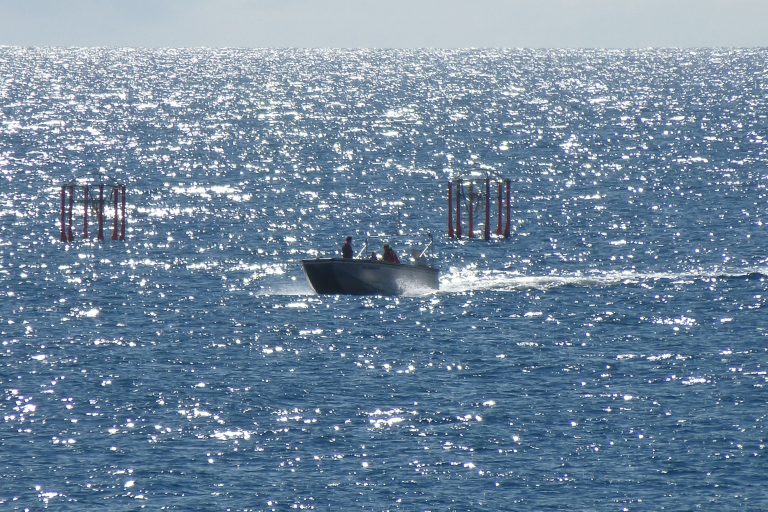3. February 2014
Acidifying the Atlantic
First field experiment on effects of ocean acidification in open ocean ecosystems starts at Gran Canaria

For the first time, an international team of 70 marine scientists investigates impacts of ocean acidification on pelagic ecosystems. Biologists, chemists, biogeochemists and physical oceanographers cooperate closely to analyse responses to projected future ocean change. The field experiment with the KOSMOS mesocosms is conducted at Taliarte, Gran Canaria as a joint activity of the German research networks BIOACID (Biological Impacts of Ocean Acidification) and SOPRAN (Surface Ocean Processes in the Anthropocene) between January and April 2014.
In nutrient-rich Northern European fjords and cool Arctic waters, ocean acidification is likely to cause a boom at the base of the food web – while larger phytoplankton species seem to miss out. But how will ecosystems of the nutrient-poor open sea react when more carbon dioxide (CO2) from the atmosphere is dissolved in seawater? A team of 70 scientists from Germany, Spain, France, Sweden, the United Kingdom, the Netherlands and the U.S. set off to investigate the effects of ocean acidification in the eastern subtropical Atlantic. From the end of January to April they are hosted by the marine research station Plataforma Oceánica de Canarias (PLOCAN) to conduct a large-scale mesocosm study at the east coast of Gran Canaria. The experiment with the KOSMOS mesocosms developed in Kiel is a joint activity of the German research networks BIOACID (Biological Impacts of Ocean Acidification) and SOPRAN (Surface Ocean Processes in the Anthropocene). Both BIOACID and SOPRAN are funded by the German Federal Ministry of Education and Research.
“Our earlier experiments focused on highly productive, nutrient-rich coastal areas”, Prof. Ulf Riebesell states. The professor of Biological Oceanography at GEOMAR Helmholtz Centre for Ocean Research Kiel coordinates the BIOACID project and the KOSMOS mesocosm experiments. “But more than two thirds of the global ocean are characterized by low nutrient levels and thus low productivity. To make reliable predictions about the future ocean, we need to learn more about how these oligotrophic ecosystems respond to ocean change.” Nutrient-poor regions are usually dominated by tiny phytoplankton organisms, called picoplankton. Because picoplankton displayed particularly strong responses to CO2-induced acidification in previous studies, the scientists expect severe impacts at the base of the food web.
In January 2014, the German research vessel POSEIDON brought more than 24 tons of equipment to Gran Canaria. On February 2nd, nine mesocosms, each of them enclosing 55 cubic metres of sea water, were deployed at Melenara Bay, close to the harbour of Taliarte by the German research vessel POSEIDON. The “giant test tubes” are now brought to carbon dioxide levels that represent values from today until the year 2100. Until mid-April, the scientists are going to measure about 50 different biological, chemical and physical parameters and collect samples. In the labs of PLOCAN, they are going to process their samples and prepare them for further analyses at their home institutes.
“This year, we are cooperating with a local aquaculture to raise sea bream larvae and release them into the mesocosms. Also, sea urchins will be collected and eggs fertilized so that we are able to add two larger species to our little worlds. We tried this for the first time during last year’s experiment and learned a lot about follow-up reactions along the food chain”, Riebesell explains.
As a novelty, the researchers are going to simulate natural fertilisation in a form typical for this area: Upwelling of nutrient-rich deep water through mesoscale eddies, circular currents developing in the wake of the Canary Islands. “POSEIDON is coming back to support us with this at the end of February”, Riebesell reports. “With a plastic bag of 80 cubic metres, we are going to capture deep-sea water off the Canaries and inject it into the mesocosms to simulate this kind of upwelling.” These nutrient infusions cause a boost of productivity in the nutrient-poor ocean desert. So far it’s unknown how these productivity hotspots react to ocean acidification and how this affects the oceanic food web.
The 2014 campaign off Gran Canaria is the fifth in a series of field experiments conducted with the Kiel KOSMOS mesocosm platform. “Our study in the Canary Current System complements the extensive data set on impacts of acidification on the pelagic ocean collected over the past five years”, Riebesell summarizes. “Once completed, it will be the most comprehensive data set on ecosystem responses to future ocean change. It will still take researchers some years to fully digest this unique set of measurements. But it will push the door wide open to new insights and a deeper understanding of the consequences of global change for marine ecosystems and the services they provide to human society.“
Institutions involved:
University of Las Palmas de Gran Canaria, Spain
University of La Laguna, Spain
University of Barcelona, Spain
Alfred Wegener Institute, Helmholtz Centre for Polar and Marine Research (AWI), Bremerhaven, Germany
Carl von Ossietzky University Oldenburg, Germany
GEOMAR Helmholtz Centre for Ocean Research Kiel, Germany
Leibniz Institute for Baltic Sea Research Warnemünde (IOW), Germany
Leibniz Institute of Freshwater Ecology and Inland Fisheries, Berlin (IGB), Germany
Max Planck Institute for Chemistry, Mainz, Germany
Bigelow Laboratory, Maine, USA
European Centre for Research and Education in Environmental Geosciences (CEREGE), Paris, France
Royal Netherlands Institute for Sea Research (NIOZ), The Netherlands
University of Edinburgh, United Kingdom
University of Gothenburg, Sweden